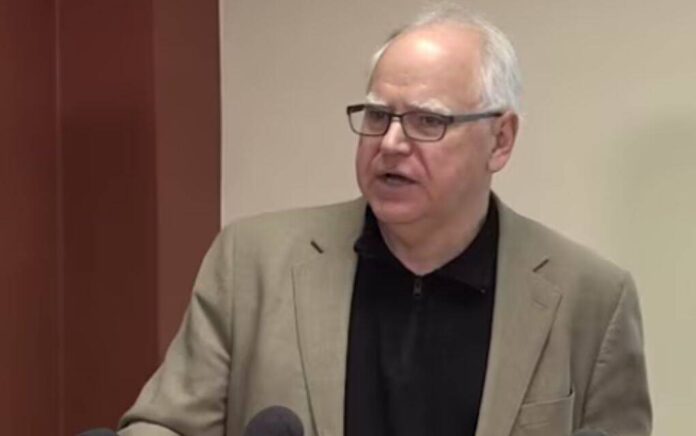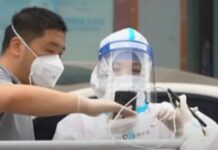
Walz has found himself to be in a world of trouble. The skeletons in his closet are being revealed one by one.
And Tim Walz’s ties to communist China have reached a boiling point because of this bombshell report.
Gov. Tim Walz (D-MN) has been a staunch supporter of the Hormel Institute, a Minnesota-based research center known for its collaboration with the Wuhan Institute of Virology (WIV) in China, according to records reviewed by the Washington Examiner. The WIV, which has been at the center of discussions around the COVID-19 lab leak theory, has maintained research partnerships with the Hormel Institute for years.
The Hormel Institute, located in Austin, Minnesota, frequently works with the WIV on a range of scientific projects. For more than a decade, Walz has visited the research center and worked to secure millions of dollars in funding for it. Records show that the institute has acknowledged his efforts and expressed gratitude for his financial support.
This connection between Walz and the WIV is particularly noteworthy as the Democratic governor faces scrutiny in a congressional investigation over his “extensive” ties to China. Recently, the U.S. government halted federal funding to a nonprofit organization that had worked with the Wuhan lab, which the FBI has said is likely the source of the COVID-19 outbreak.
Walz himself has reportedly traveled to China 30 times, including for his honeymoon. In 2016, he stated that he didn’t “fall into the category that China necessarily needs to be an adversarial relationship” with the U.S.
“For 80+ years, the Hormel Institute has helped pave the way for Minnesota to lead in biomedical innovation,” Walz said in April, according to a statement issued by the institute. The governor emphasized the importance of the facility, which has been linked to Beijing Genomics Institute, a Chinese military-backed entity. “It was great to stop by their facilities yesterday in Austin to see that work in action,” he added.
In Walz’s view, the Hormel Institute plays a crucial role in positioning Minnesota for a future centered around “green energy, sustainable agriculture, and the ability to feed a very hungry world,” as well as being a potential biotech hub for the nation.
The governor’s involvement with the institute dates back to his time as a congressman, when he helped secure over $2 million for the center’s technological advancements. He has also advocated for major expansions of the facility and sought additional federal funds for its growth.
In recent years, the Hormel Institute has collaborated with the WIV on various research initiatives, including a 2020 COVID-19 study and a 2023 structural biology project. One such study, titled “A dynamic regulatory interface on SARS-CoV-2 RNA polymerase,” involved contributions from researchers at both the Hormel Institute and the WIV, as well as a Yale School of Medicine professor.
In addition, the Hormel Institute disclosed in a separate 2020 study published in the EMBO Journal that it received “help from the Core Facility and Technical Support” of the WIV for conducting radioactive and fluorescent tests. Bin Liu, a professor at the Hormel Institute who contributed to the study, attended Wuhan University. The research team also included scientists from the University of Chinese Academy of Sciences and China’s Zhengzhou University.
More recently, in January 2024, Hormel Institute researchers collaborated with WIV scientists Lina He, Wei Zhou, and Yangbo Hu on a genetics study, utilizing the WIV’s facilities for radioactive testing. The WIV’s Yangbo Hu had previously worked with Hormel’s Dmytro Kompaniiets, Dong Wang, and Bin Liu on a 2023 study focused on bacterial transcription activation mechanisms.
The WIV, established in 1956, is overseen by the Chinese Academy of Sciences, which reports directly to the Chinese Communist Party’s State Council. According to the U.S. State Department, the institute has engaged in classified research on behalf of the Chinese military since at least 2017.
In response to the Washington Examiner’s inquiries, Jake Ricker, a spokesman for the University of Minnesota, emphasized that the school and the Hormel Institute maintain no “formal affiliation” with either the WIV or Beijing Genomics Institute. “Our discoveries are peer-reviewed and published in the public domain with appropriate attribution to those who contributed to each study,” Ricker stated. He further assured that research conducted at the Hormel Institute adheres to federal disclosure and security regulations.
However, former White House National Security Council member Brian Cavanaugh expressed concern over the collaboration between U.S. entities and the WIV. “The Wuhan Institute of Virology has direct ties to China’s People’s Liberation Army,” Cavanaugh told the Washington Examiner. “The Hormel Institute is helping a foreign adversary.”
Beyond its work with the WIV, the Hormel Institute has faced scrutiny for other links to China. In 2019, Dr. Zigang Dong, the institute’s former executive director, resigned after 18 years following an FBI investigation into his “possible failure to report foreign backing when applying for grants,” according to the Austin Daily Herald.
Dong has since taken up a position at Zhengzhou University in China, where he continues to collaborate with Hormel researchers. Dong also helped establish the China-US (Henan) Hormel Cancer Institute, a research facility affiliated with the Hormel Institute.
Walz, who supported the creation of the China-based institute, praised the collaboration at the time, noting, “The collaboration brings more resources, it brings more collaboration in terms of what that scientific data is showing.” According to an archived version of the Chinese institute’s website, China’s government provided ongoing financial support to sustain the partnership.
No matter one’s political affiliation, it should be very disturbing for Americans that the Democratic nominee for vice president has ties to communist China. Especially when those ties involve the Wuhan Institute of Virology.
Stay tuned to The Federalist Wire.



















